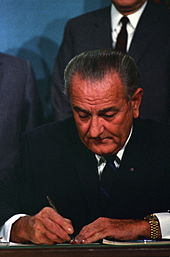The Public Broadcasting Act of 1967 (47 U.S.C. § 396) set up public broadcasting in the United States, establishing the Corporation for Public Broadcasting (CPB) and, eventually, the Public Broadcasting Service (PBS), and National Public Radio (NPR). The act charged the CPB with encouraging and facilitating program diversity, and expanding and developing non-commercial broadcasting. The CPB would have the funds to help local stations create innovative programs, thereby increasing the service of broadcasting in the public interest throughout the country.
View Act: https://www.gpo.gov/fdsys/pkg/STATUTE-81/pdf/STATUTE-81-Pg365.pdf
The act was supported by many prominent Americans, including Fred Rogers (“Mister Rogers”), one of the founders of NPR and creator of All Things Considered Robert Conley, and Senator John O. Pastore, then chairman of the Senate Subcommittee on Communications, during the House and United States Senate hearings in 1967.
The United States House of Representatives passed the bill 266-91 on September 21, 1967, with 51 members voting “present” and two not voting.[2]
When President Lyndon B. Johnson signed the act into law on November 7, 1967, he described its purpose as:
It announces to the world that our nation wants more than just material wealth; our nation wants more than a ‘chicken in every pot.’ We in America have an appetite for excellence, too. While we work every day to produce new goods and to create new wealth, we want most of all to enrich man’s spirit. That is the purpose of this act.[3]
It will give a wider and, I think, stronger voice to educational radio and television by providing new funds for broadcast facilities. It will launch a major study of television’s use in the Nation’s classrooms and its potential use throughout the world. Finally — and most important — it builds a new institution: the Corporation for Public Broadcasting.”[3]
The act was originally to be called the “Public Television Act” and focus exclusively on television, worrying supporters of public radio. However, in a sudden change of fortune, Senator Robert Griffin suggested changing the name to the “Public Broadcasting Act” when the bill passed through the Senate. After several revisions, including last-minute changes added with Scotch Tape, the law signed by Johnson included radio. This set the path for the incorporation of National Public Radio (NPR) in 1970.
